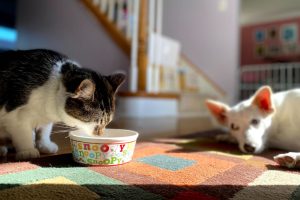Cats and dogs may be both beloved pets, but when it comes to their dietary needs, they are quite different. Have you ever wondered why cats can’t have dog food? Well, the answer lies in their unique nutritional requirements.
The Importance of Taurine in Cat Diets
Taurine is essential for cat health, playing a crucial role in maintaining healthy eyesight, a strong heart, and reproductive function. Unlike dogs, cats cannot synthesize taurine in their bodies, making it vital to include in their diet. However, dog food may not always provide adequate levels of taurine for our feline friends.
To ensure your cat is getting enough taurine, opt for cat-specific food that is formulated with higher levels of this essential amino acid. Regularly feeding your cat dog food can lead to taurine deficiency, which can result in serious health issues, including blindness and heart problems.
It’s best to stick to cat food that is specifically designed to meet your feline companion’s unique nutritional needs and always check the label for taurine content to ensure your cat is getting enough.
Protein Levels and Quality for Cats
Cats are obligate carnivores, meaning they require a diet high in animal protein to thrive. Dog food, on the other hand, may not provide adequate protein levels or quality for our feline friends.
Cats need a higher protein intake compared to dogs to maintain optimal health and muscle mass. Feeding your cat dog food regularly can result in protein deficiency, leading to muscle wasting and other health issues.
When choosing cat food, look for high-quality sources of animal protein such as chicken, turkey, or fish. Avoid dog food for your cat to ensure they are receiving the necessary protein for optimal health.
Differences in Fat Content Between Cats and Dogs
Cats and dogs have different metabolic needs when it comes to fat content in their diets. Cats are obligate carnivores, meaning they require a diet high in animal-based proteins and fats. On the other hand, dogs are omnivores and can thrive on a more varied diet.
Here’s why cats can’t have dog food: 1. Taurine Requirement: Cats need a specific amino acid called taurine in their diet, which is found naturally in meat. Dog food may not contain enough taurine to meet a cat’s needs, leading to potential health issues like heart disease. 2. Fat Metabolism: Cats have a higher requirement for arachidonic acid, a type of omega-6 fatty acid found in animal fats. Dog food, which may have different fat content, may not provide enough of this essential nutrient for cats. 3. Protein Levels: Cats need higher protein levels in their diet compared to dogs. Dog food may not have enough protein to support a cat’s unique dietary requirements, which can lead to malnutrition over time.
Urine pH and Cat Food
The pH level of a cat’s urine plays a crucial role in their overall health. When it comes to cat food, the acidity or alkalinity of the diet can impact the urine pH level. Dog food can be problematic for cats in this regard.
How dog food affects a cat’s urine pH:
– Alkaline Content: Dog food tends to have a higher pH than cat food, which can lead to a more alkaline urine pH in cats. This can predispose cats to urinary issues like urinary tract infections or the formation of crystals in the urine.
– Acidic Environment: Cats naturally have more acidic urine than dogs, which helps prevent the formation of urinary crystals and keeps the urinary tract healthy. Feeding a cat dog food can disrupt this delicate balance and lead to potential health problems.
In conclusion, a cat’s unique dietary requirements, including differences in fat metabolism and urine pH levels, make it crucial for them to have a balanced diet specifically formulated for felines. Feeding cats dog food can lead to nutritional deficiencies and health issues, so it’s essential to provide them with the right nutrition tailored to their specific needs.
Essential Nutrients for Cats
When it comes to feline nutrition, cats have unique dietary needs that are different from dogs. Cats require specific nutrients like taurine, arachidonic acid, and preformed vitamin A that may not be present in dog food. These nutrients are crucial for maintaining overall health and preventing deficiencies in cats. Taurine is especially important for heart function and eye health in cats, while arachidonic acid supports their skin and coat. Vitamin A is essential for vision and immune function in our feline friends. So, feeding cats dog food can lead to serious health issues due to the lack of these essential nutrients. It’s vital to choose cat food that is specially formulated to meet their unique nutritional requirements.
Dental Health and Cat Food Choices
Have you ever noticed that cat food comes in a variety of shapes and sizes? That’s because the texture and shape of cat food are designed to promote dental health in cats. The crunchy kibbles help to reduce plaque and tartar buildup on their teeth, which can prevent dental issues like gum disease and tooth decay. On the other hand, dog food is often larger and softer in texture, which doesn’t provide the same benefits for cats’ dental health. Feeding cats dog food can increase their risk of dental problems, making it essential to choose cat-specific food for their overall well-being. Remember, good dental health is crucial for your cat’s longevity and quality of life.
Allergies and Sensitivities in Cats
Did you know that just like humans, cats can have allergies and sensitivities to certain ingredients in their food? That’s right! Some cats may be allergic to common ingredients found in dog food, such as beef or grains. These allergies can cause uncomfortable symptoms like skin irritation, vomiting, and diarrhea, making it crucial to feed your feline friend the right kind of food.
When a cat is allergic to a specific ingredient in dog food, it can lead to serious health issues and affect their overall well-being. That’s why it’s essential to be mindful of what you’re feeding your cat and stick to cat-specific food to avoid any potential allergic reactions.
Additionally, cats have different nutritional requirements than dogs, meaning that dog food may lack essential nutrients that cats need for optimal health. For example, taurine is an amino acid that cats must obtain from their diet, as they cannot produce it on their own. Dog food may not provide enough taurine for cats, leading to serious health problems like heart disease.
To ensure your feline companion stays healthy and happy, always opt for cat-specific food that meets their unique dietary needs. Your cat will thank you for it!
Homemade vs. Commercial Cat Food Options
When it comes to choosing the right food for your beloved feline friend, you may be torn between homemade and commercial cat food options. Both have their advantages and disadvantages, so let’s break it down.
Homemade Cat Food:
– Allows you to have full control over the ingredients your cat consumes.
– Enables you to cater to any specific dietary needs or preferences your cat may have.
– Can be more cost-effective in the long run.
Commercial Cat Food:
– Formulated to meet all of a cat’s nutritional needs.
– Convenient and easy to store and serve.
– Provides a balanced diet that eliminates the guesswork of creating homemade meals.
While homemade cat food can be a great option if done correctly, it’s essential to consult with a veterinarian or a pet nutritionist to ensure your homemade recipes are balanced and provide all the necessary nutrients for your cat. On the other hand, commercial cat food is designed to provide complete and balanced nutrition for your feline companion, making it a convenient and reliable choice for many cat owners. Ultimately, the key is to choose a high-quality cat food that meets your cat’s unique dietary requirements for a long and healthy life.
Alex, a passionate animal lover, has experience in training and understanding animal behavior. As a proud pet parent to two dogs and three cats, he founded AnimalReport.net to share insights from animal experts and expand his knowledge of the animal kingdom.




